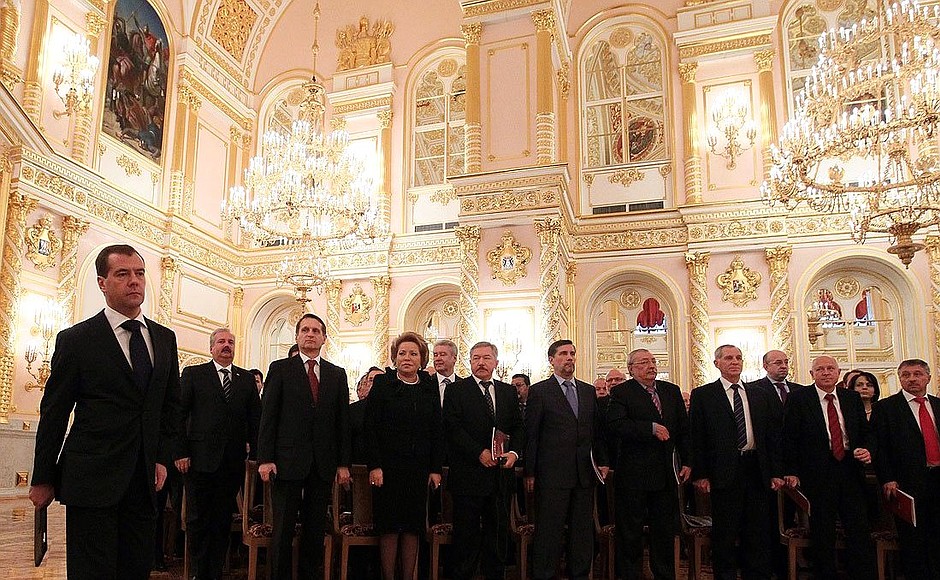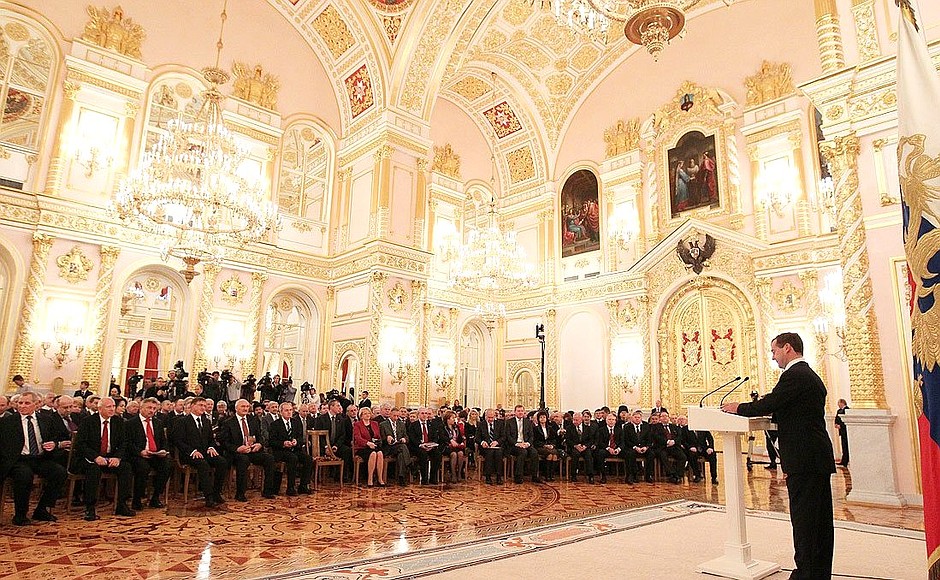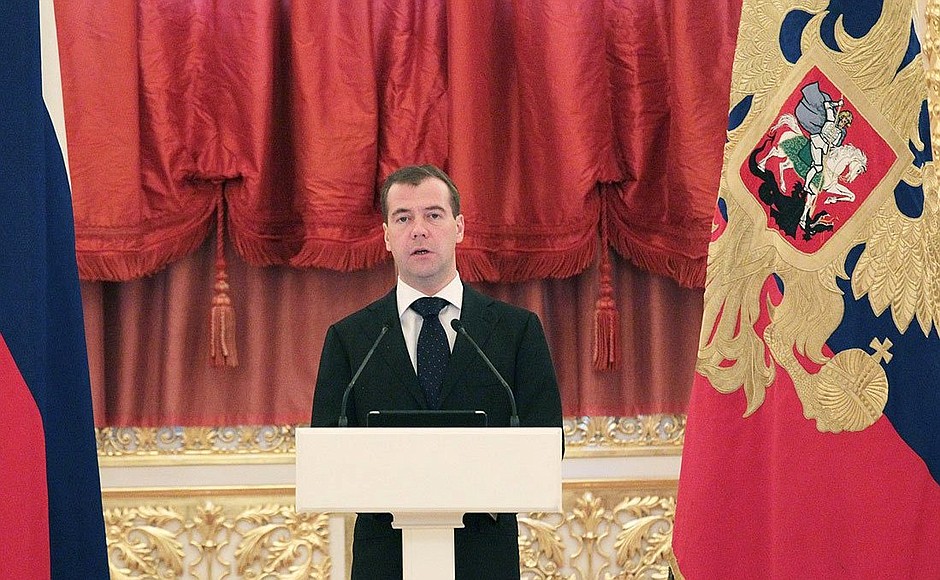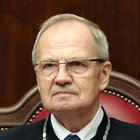The meeting at the Kremlin was also attended by President of the Constitutional Court Valery Zorkin, President of the Higher Arbitration Court Anton Ivanov, President of the Supreme Court Vyacheslav Lebedev, Justice Minister Alexander Konovalov, Constitutional Court judges, Prosecutor General's Office representatives, Mayor of Moscow Sergei Sobyanin, Federation Council Speaker Valentina Matviyenko, Chief of Staff of the Presidential Executive Office Sergei Naryshkin, foreign representatives of the constitutional justice system, the European Court of Human Rights, and public and academic organisations.
* * *
President of Russia Dmitry Medvedev: Esteemed judges of the Constitutional Court, colleagues, ladies and gentlemen!
We have gathered in this hall in the Kremlin to mark the 20th anniversary of the Russian Constitutional Court. First of all, I sincerely congratulate all of you on this anniversary, all those involved in the Constitutional Court, and would like to thank everyone who came here to take part in this celebration.
The anniversary of the Constitutional Court is of great importance for our country because the Court’s establishment was a key event in the history of Russia, which at that time was embarking on the path of democracy and the rule of law. The establishment of an entirely new legal institution was a major priority for the Russian authorities in that period. It was vitally important at that time, just as it is today, to preserve the irreversibility of the changes that have occurred in our country over the past 20 years, and to leave behind the traditions of unlimited power. We could say that the Constitutional Court is a very powerful vaccine against totalitarian habits.
Today, two decades later, we realise perhaps even more clearly how much need there was for constitutional justice in that period; we pay tribute to the legislative and executive authorities who made the choice to establish an institution that has the power to keep the government within the limits set by the Constitution. And since then, all government officials, all state bodies, including the head of state, must unconditionally accept the decisions of the Constitutional Court. This is one of the symbols of our democratic development.
I would also like to note that as it sets limits for the authorities and corrects their mistakes, the Constitutional Court itself is strictly governed by the provisions of our fundamental law, the Constitution, and does not exist outside our legal system. Thus, it has made a great contribution to the creation of a complete system of the separation of powers and the strengthening of social stability in our country, which is a major achievement.
The competence of the Constitutional Court and the nature of its high mission are defined by the Constitution and our laws, which make it clear that the Court must pass judgements only on legal issues, acting alone and independently. Nobody has the right to interfere in its activities and its decisions are irreversible. Its legal positions are a generally binding precept for the legislators and for those who apply the law.
Such extensive legal powers entail a great responsibility, especially as there is no authority that could correct a mistake made by the Constitutional Court. Our Constitutional Court has never given reason to doubt its competence, which I think is very important, has proven its worth and become a true guarantor of the Constitution, has earned a reputation as a major public body, which has steadily upheld the rule of law and the need for clarity and lack of ambiguity in legislation.
The Constitutional Court does a very important job of protecting the rights and freedoms of our citizens. They appeal directly to the Constitutional Court, believing that this institution is their defender against attempts to violate their rights, their protector, whether the case involves an incorrect or poorly written legal provisions or the corruption of those who apply the law. The Court has already done much to restore the legitimate rights and interests of our citizens, protecting and restoring their social, economic and civil rights based on the international standards in this area, which is also important for our young legal and judicial systems.
It is also a special merit of the Constitutional Court that in considering such cases it places the interests of an individual at the top, having introduced the constitutional notion of human dignity.
The Constitutional Court has received more than 13,000 petitions this year alone. The vast majority of these petitions are appeals from citizens or public associations. In considering these appeals, the Court always shows, within the framework of the Constitution, of course, that the rights of citizens should be protected by the state. At the same time, the Court has repeatedly emphasised the need to achieve a balance of parties’ rights and obligations, in particular in respect of labour rights, an area where the scope of mutual responsibility of the government, businesses and employees overlap.
Colleagues,
The activities of the Constitutional Court as the official interpreter and defender of the Constitution have earned it respect and recognition in Russian society; that is an undisputed fact. It is impossible to overestimate the Court’s role in strengthening the democratic state and the formation of a single legal space, which is crucial in our complex federative state. Its decisions determine the level of constitutional justice and affect the overall development of legislation in our country, helping improve our national judicial system.
In conclusion, I would like to thank all the Constitutional Court judges for their conscientious efforts, dedication and professionalism in their demanding work. Once again I congratulate all of you on the anniversary and wish you all the best.
<…>









